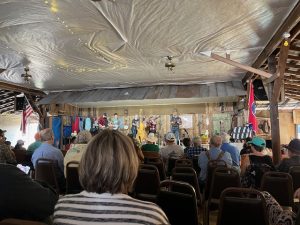
I once thought I’d like to become a musicologist. It’s a fascinating field that studies music, how music came to be, and how it interacts within cultures. I think a good musicologist must be part musician, part historian, and part anthropologist.
I remember reading an account of the adventures of a 20th century musicologist that astounded me. Before World War I, this musicologist (I want to say his name was Green, but I’m not sure) embarked on a journey to America’s Appalachian region to transcribe the songs that had been passed down among the Scotch Irish who had lived secluded in the region’s mountains and hollers for generations. People there learned their music by listening and repeating—pretty much how freshmen learn their college songs and can still belt them out 50 years later at reunions.
Much of the music particular to Appalachia is based on the Dorian mode, an antique “scale” known to America’s settlers in the Appalachian Mountains. (Our major and minor scales are only two of those antique modes.) Because the tunes, sung for years in those mountains, have a sad or minor key sound, the Dorian mode is often called “mountain minor.”
Enter World War I and the young men of Appalachia left the hills to become soldiers. When they returned home, they shared what they had seen, heard, and experienced from the rest of America and the world. After several years, “Mr. Green” returned and discovered people had forgotten those hand-me- down songs in that quaint mountain minor. He had to re-teach them their own songs.
How fragile traditions are within a culture!
Our Native American code talkers in World War II couldn’t have contributed to our victory as significantly as they did, unless the generations preceding them had not passed on their tribal languages, despite our nation’s best efforts to erase their culture.
I recently enjoyed listening to amazing musicians play Tennessee blue-grass music in a barn filled with blue-grass fans, desserts, and crock pots of down-home cooking. (I got a kick out of the Golden Retriever that wandered onto and off the stage before the program started.)
I believe it’s a mistake to think that songs, dances, customs, and languages of the past are less valuable than what is currently popular. As we recreate culture for our own times, we need to treasure and pass on what we received from our forefathers because it is immensely fragile and tragically irreplaceable.


Yes, history has to be preserved or mankind might lose the significant lessons that events have taught us. Musical measures are a great way of preserving our memories; even those with dementia who have forgotten their relatives have been shown to recollect childhood songs!